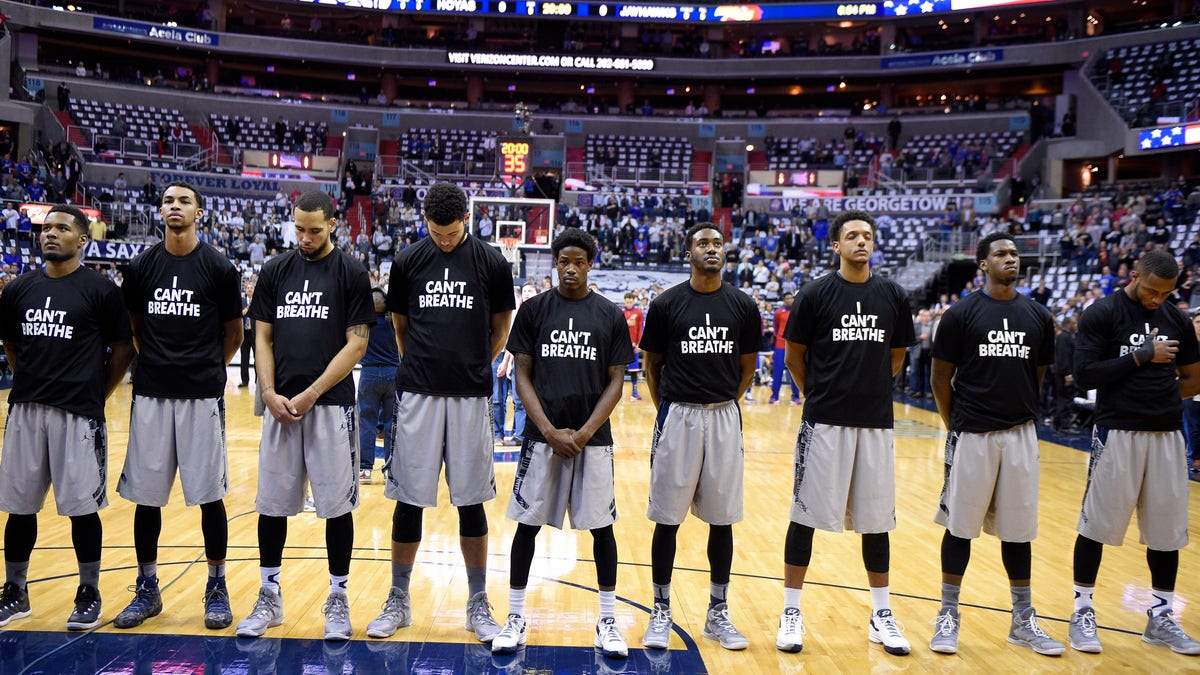
Dec. 10, 2014: Members of the Georgetown basketball team stand for the National Anthem wearing "I Can't Breathe" t-shirts before an NCAA college basketball game against Kansas, (AP)
The first major "I Can't Breathe" protest from college sports would naturally come from Georgetown, where societal statements are part of the school's DNA.
And what a powerful one it was. The entire roster emerged for the final warmups before the Hoyas' loss to No. 10 Kansas on Wednesday night wearing black short-sleeve T-shirts with the words "I CAN'T BREATHE" in bold white letters.
The players wore the T-shirts during the national anthem while lined up across the court, an image that could bring to mind protesters blocking traffic on a city street in silent, nonviolent defiance. Then they shook hands with the Jayhawks before taking off the shirts for the announcement of the starting lineups.
Many notable professional athletes — including LeBron James and Kobe Bryant — have written the message on their warmups or other equipment in recent days, echoing the last words spoken by Eric Garner as police were attempting to arrest him in New York in July. A grand jury decided last week not to indict the officers involved, spurring protests across the country.
It should be no surprise that coach John Thompson III would allow his players to make such a statement. His father, longtime Hoyas coach John Thompson Jr., was known for taking bold positions during a Hall of Fame career, especially in support of minorities. Most famously, the elder Thompson walked off the court before a home game in 1989 to protest NCAA Proposition 42, which restricted the criteria under which athletes could receive scholarships.
After the game, Thompson III gave a detailed, eloquent explanation for the T-shirts, saying it was a player-driven idea that had its origins after the team watched a similar grand jury decision concerning another shooting — that of Michael Brown in Ferguson, Missouri — live on television while in the Bahamas for a holiday tournament.
The coach said the players initially wanted to wear the shirts at the Hoyas' previous game, but he first wanted to have more conversations with them to make sure they all understood the answer to the question: "Why do you want to wear this shirt?"
"You can go from Patrick Ewing wearing a T-shirt underneath his jersey, then it becomes something that everyone does," Thompson III said. "Allen Iverson braiding his hair and playing in the league, then it becomes something everyone does. Kobe wearing the tights and then everyone does it.
"And this isn't that. This isn't one of those things where you go along just because it's something that's trending. We have had a lot of discussions, and the emotions as it relates to the protest the guys wanted to do today, the emotions and the feelings in the locker room are all over the place, meaning not necessarily everyone feels the same way.
"The emotions are from fear to frustration to confusion to anger, and the reasons why every individual wanted to wear it is all over the place, too, which is probably pretty consistent with the emotions across the country right now. ... I think the group wanted to possibly put ourselves in the position to be a part of a process, to help where there's positive change, as opposed to just negative reactions."
Junior guard D'Vauntes Smith-Rivera referenced the names of Brown and Trayvon Martin as he spoke about the protest, saying it goes beyond one case in New York.
"We really wanted to represent those families that all lost (a loved) one," Smith-Rivera said.
Added senior center Joshua Smith: "We didn't wear the shirts to say that the cops were wrong or the system was wrong. We just wore the shirts just to show our condolences to the family because no matter how you look at it, we don't know who was right or wrong, but they still lost somebody. And they won't get that person back."
When Thompson III was asked about his father's legacy of speaking his mind, the elder Thompson spoke up from the back of the room.
"It's a (expletive) school, man," Thompson Jr. said. "That's your responsibility to deal with things like that. We're not a ... damn pro team."
Kansas freshman guard Kelly Oubre was impressed by the Georgetown players' stand.
"That's definitely a powerful statement that those guys collectively made," Oubre said. "I respect them for doing that, and they did it all as a team, too, so it was something good to watch."
Jayhawks coach Bill Self didn't see the protest because he was focused on preparing for the game, but he also supported the players' action.
"It's a pretty strong stance," Self said. "And I think it's pretty good, and it certainly shows a lot of solidarity amongst their unit. And I don't see anything negative with it at all."
